Sixty Years Since the Formation of the National People’s Army of the GDR
Actually, the history of the National People’s Army of the GDR began after West Germany began to form its own armed forces. In the post-war years, the Soviet Union pursued a much more peaceful policy than its Western opponents. Therefore, for a long time, the USSR sought to comply with the agreement and was in no hurry with the armament of East Germany. As it is known, according to the decision of the Conference of the Heads of Government of Great Britain, the USSR and the USA, which took place on July 17 - August 2 1945 in Potsdam, Germany was forbidden to have its own armed forces. But after the end of World War II, relations between yesterday’s allies — the USSR, on the one hand, and the United States and Great Britain, on the other, quickly deteriorated and soon became extremely tense. The capitalist countries and the socialist camp were on the verge of an armed confrontation, which in fact gave rise to the violation of the agreements that were reached in the process of victory over Nazi Germany. By 1949, the Federal Republic of Germany was established on the territory of the American, British and French occupation zones, and the German Democratic Republic was established on the territory of the Soviet occupation zone. The first to militarize "their" part of Germany — the FRG — began the United Kingdom, the United States and France.
In 1954, the Paris Agreements were concluded, the secret part of which provided for the creation by West Germany of its own armed forces. Despite the protests of the West German population, which saw in the re-establishment of the country's armed forces the growth of revanchist and militarist sentiment and feared a new war, November 12, 12, the government of Germany announced the creation of the Bundeswehr. Thus began the history of the West German army and the history of the almost undisguised confrontation of the "two Germany" in the sphere of defense and armaments. After the decision to create the Bundeswehr, the Soviet Union had no choice but to “give the go-ahead” to form its own army and the German Democratic Republic. The history of the National People's Army of the GDR has become a unique example of a strong military community of the Russian and German armies, which in the past fought more with each other than cooperated. Do not forget that the high combat capability of the NNA was explained by the entry of Prussia and Saxony into the GDR, the lands from which the main body of the German officers came from. It turns out that the NNA, and not the Bundeswehr, largely inherited the historical traditions of the German armies, but this experience was put at the service of military cooperation between the GDR and the Soviet Union.
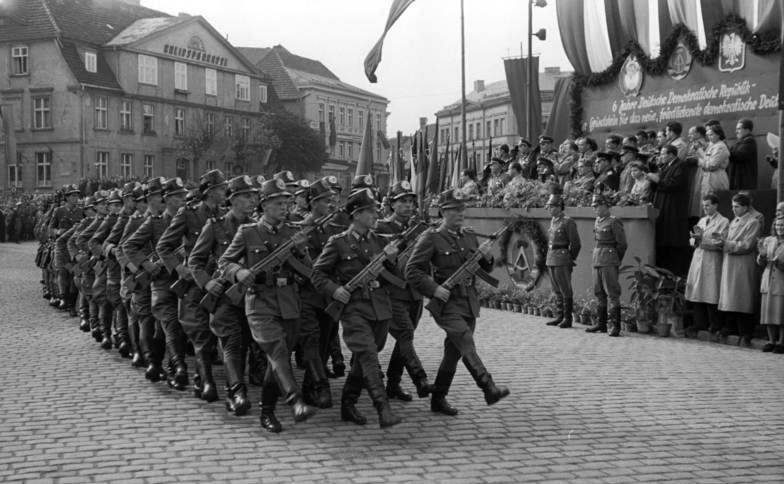
The barracks folk police - the predecessor of the NNA
It should be noted that in fact the creation of armed units, whose service was based on military discipline, began even earlier in the GDR. In 1950, the People’s Police was established as part of the Ministry of the Interior of the GDR, as well as two main divisions - the General Directorate of the Air Police and the General Directorate of the Maritime Police. In 1952, on the basis of the Main Directorate of Combat Training of the People's Police of the GDR, the Barracks People's Police was created, which was an analogue of the internal forces of the Soviet Union. Naturally, the KNP could not conduct combat operations against modern armies and was called upon to perform purely police functions - to fight sabotage and bandit groups, to disperse riots, to protect public order. This was confirmed by the decision of the 2 Party Conference of the Socialist United Party of Germany. The barracks people's police was subordinated to the Minister of Internal Affairs of the GDR, Willy Shtof, and the direct leadership of the Barracks People's Police was carried out by the KNP chief. Lieutenant General Heinz Hoffman was appointed to this post. The personnel of the Barracks People's Police were recruited from among volunteers who signed a contract for a period of at least three years. In May, 1952 took charge of the Barracks People's Police of the Ministry of the Interior of the GDR and took the Union of Free German Youth, which contributed to a more active influx of volunteers into the ranks of the barracks police and the improvement of the rear infrastructure of this service. In August, 1952 was a part of the Barracks People's Police of the GDR, which included the first independent Maritime People’s Police and the Air People’s Police. In September, the National Airborne Police of 1953 was transformed into the Aero Club Directorate of the KNP. She had two airfields Kamenz and Bautzen, training aircraft Yak-18 and Yak-11. The maritime police force had patrol boats and small minesweepers.
In the summer of 1953, it was the Barracks People’s Police, along with the Soviet troops, that played one of the main roles in suppressing the riots organized by the US-British agents. After this, the internal structure of the Barracks People’s Police of the GDR was strengthened and its military component strengthened. Further reorganization of the KNP on a military model continued, in particular, the Main Headquarters of the Barracks People’s Police of the GDR was created, headed by Lieutenant General Vincenz Müller, a former Wehrmacht general. The Sever Territorial Administration, headed by Major General German Rentsch, and the South Territorial Administration, headed by Major General Fritz Jone, were also created. Each territorial administration had three operational units subordinate, and a mechanized operational unit was subordinate to the General Staff, and even 40 units of armored vehicles were armed with them, including Tanks T-34. The operational units of the Barracks People’s Police consisted of reinforced motorized infantry battalions with up to 1800 personnel. The structure of the operational detachment included: 1) the headquarters of the operational detachment; 2) a mechanized company on armored vehicles BA-64 and SM-1 and motorcycles (in the same company armored SM-2 armored water tankers were armed); 3) three motorized infantry companies (on trucks); 4) a fire support company (field artillery platoon with three ZIS-3 guns; anti-tank artillery platoon with three 45 mm or 57 mm anti-tank guns; mortar platoon with three 82 mm mortars); 5) headquarters company (communications platoon, sapper platoon, chemical platoon, reconnaissance platoon, transport platoon, supply platoon, management department, medical department). Military ranks were established in the Barracks People’s Police and a military uniform was introduced that was different from the People’s Police uniform of the Ministry of Internal Affairs of the GDR (if the people’s police officers wore a dark blue uniform, then the barracks police officers received a more “paramilitary” protective color). The military ranks in the Barracks People’s Police were established as follows: 1) soldier, 2) corporal, 3) non-commissioned officer, 4) headquarters non-commissioned officer, 5) sergeant major, 6) sergeant sergeant major, 7) non-commissioned lieutenant, 8) lieutenant, 9) lieutenant, 10) captain, 11) major, 12) lieutenant colonel, 13) colonel, 14) major general, 15) lieutenant general. When the decision was made to create the National People’s Army of the GDR, thousands of employees of the Barracks People’s Police of the Ministry of Internal Affairs of the GDR expressed a desire to join the National People’s Army and continue their service there. Moreover, in fact it was precisely in the structure of the Barracks People’s Police that the “skeleton” of the NNA — ground, air and sea units — was created, and the command staff of the Barracks People’s Police, including top commanders, almost completely became part of the NNA. The employees remaining in the Barracks People’s Police continued to carry out the functions of protecting public order and combating crime, that is, they retained the functionality of the internal troops.
"The founding fathers" of the army of the GDR
1 March 1956. The Ministry of National Defense of the GDR began its work. He was led by Colonel-General Willy Shtof (1914-1999), in 1952-1955. Minister of the Interior. A pre-war communist, Willy Stoph joined the Communist Party of Germany at the age of 17. As an underground worker, he nevertheless could not avoid service in the Wehrmacht and in 1935-1937. served in an artillery regiment. Then he was demobilized, worked as an engineer. During the Second World War, Willy Shtof was again called up for military service, participated in battles on the territory of the USSR, was injured, and was awarded the Iron Cross for displaying prowess. He went through the entire war and was captured in 1945. While in the Soviet prison camp, he completed a special training course in the anti-fascist school for prisoners of war. The Soviet command was preparing from among the prisoners of war future personnel for administrative positions in the zone of Soviet occupation.
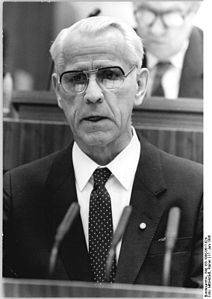 Willy Shtof, who had not previously held prominent positions in the German communist movement, made a dizzying career in several post-war years. After being released from captivity, he was appointed head of the industrial and construction department, then he headed the Economic Policy Directorate of the SED apparatus. In 1950-1952 Willy Shtof served as director of the economic administration of the Council of Ministers of the GDR, and then was appointed Minister of the Interior of the GDR. From 1950, he was also a member of the SED Central Committee - and this despite his young age - thirty-five years. In 1955, as Minister of the Interior of the GDR, Willy Shtof received the military rank of colonel general. Given the leadership experience of the power ministry, in 1956, it was decided to appoint Willy Shtof to the post of Minister of National Defense of the German Democratic Republic. In 1959, he received the next military rank of army general. From the Ministry of Internal Affairs he moved to the Ministry of National Defense of the GDR and Lieutenant General Heinz Hoffman, who held the post of the head of the Kazarmenny People's Police of the Ministry of the Interior of the GDR in the Ministry of Internal Affairs.
Willy Shtof, who had not previously held prominent positions in the German communist movement, made a dizzying career in several post-war years. After being released from captivity, he was appointed head of the industrial and construction department, then he headed the Economic Policy Directorate of the SED apparatus. In 1950-1952 Willy Shtof served as director of the economic administration of the Council of Ministers of the GDR, and then was appointed Minister of the Interior of the GDR. From 1950, he was also a member of the SED Central Committee - and this despite his young age - thirty-five years. In 1955, as Minister of the Interior of the GDR, Willy Shtof received the military rank of colonel general. Given the leadership experience of the power ministry, in 1956, it was decided to appoint Willy Shtof to the post of Minister of National Defense of the German Democratic Republic. In 1959, he received the next military rank of army general. From the Ministry of Internal Affairs he moved to the Ministry of National Defense of the GDR and Lieutenant General Heinz Hoffman, who held the post of the head of the Kazarmenny People's Police of the Ministry of the Interior of the GDR in the Ministry of Internal Affairs. Heinz Hoffman (1910-1985) can be called the second “founding father” of the National People's Army of the GDR, in addition to Willi Shtof. Coming from a working-class family, Hoffmann joined the Communist Youth League of Germany at the age of sixteen, and at the age of twenty became a member of the German Communist Party. In 1935, the underground fighter Heinz Hoffmann was forced to leave Germany and flee to the USSR. Here he was selected for education - first political in the Lenin International School in Moscow, and then the military. From November 1936 to February 1837 Hoffman took special courses in Ryazan at the Military Academy. Mv Frunze. After completing the course, he received the rank of lieutenant and already 17 March 1937 was sent to Spain, where at that time there was a civil war between Republicans and Franco. Lieutenant Hoffman received an appointment as an instructor for handling the Soviet weapons to the training battalion of the 11 International Brigade. 27 May 1937. He was appointed military commissar of the battalion "Hans Beymler" as part of the same 11-th International Brigade, and 7 July took command of the battalion. The next day, Hoffmann was wounded in the face, and July 24 - in the legs and stomach. In June, 1938, Hoffmann, previously treated in Barcelona hospitals, was exported from Spain, first to France and then to the USSR. After the beginning of the war, he worked as a translator in prisoner of war camps, then became chief political officer in the Savior and Factory Camp for prisoners of war in the territory of the Kazakh SSR. From April 1942 to April 1945 Hoffmann served as political instructor and teacher at the Central Anti-Fascist School. From April to December at 1945, he was an instructor, and then head of the 12 Party School of the Communist Party of Germany in Skhodnya.
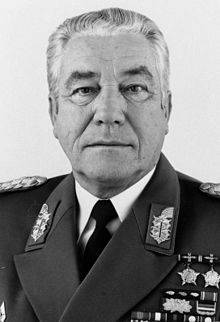 After returning to Eastern Germany in January 1946, Hoffmann worked in various positions in the SED. 1 July 1949 in the rank of Inspector General, he became Vice President of the German Department of Internal Affairs, and from April 1950 to June 1952 Heinz Hoffmann served as Chief of the Main Directorate of Combat Training of the Ministry of the Interior of the GDR. 1 July 1952. He was appointed Chief of the Barracks People’s Police of the Ministry of the Interior of the GDR and Deputy Minister of the Interior of the country. Heinz Hoffman, for obvious reasons, also made a choice when he was included in the leadership of the emerging Ministry of National Defense of the GDR in 1956. This was facilitated by the fact that from December 1955 to November 1957. Hoffman completed a course of study at the Military Academy of the General Staff of the USSR Armed Forces. Returning to his homeland, 1 December 1957 Mr. Hoffmann was appointed First Deputy Minister of National Defense of the GDR, and 1 March 1958 was also appointed Chief of the General Staff of the National People’s Army of the GDR. Subsequently, on July 14 1960, Colonel-General Heinz Hoffman replaced Willy Shtof as Minister of National Defense of the GDR. The army department of the German Democratic Republic, Army General (since 1961), Heinz Hoffmann headed until his death in the 1985 year — twenty-five years.
After returning to Eastern Germany in January 1946, Hoffmann worked in various positions in the SED. 1 July 1949 in the rank of Inspector General, he became Vice President of the German Department of Internal Affairs, and from April 1950 to June 1952 Heinz Hoffmann served as Chief of the Main Directorate of Combat Training of the Ministry of the Interior of the GDR. 1 July 1952. He was appointed Chief of the Barracks People’s Police of the Ministry of the Interior of the GDR and Deputy Minister of the Interior of the country. Heinz Hoffman, for obvious reasons, also made a choice when he was included in the leadership of the emerging Ministry of National Defense of the GDR in 1956. This was facilitated by the fact that from December 1955 to November 1957. Hoffman completed a course of study at the Military Academy of the General Staff of the USSR Armed Forces. Returning to his homeland, 1 December 1957 Mr. Hoffmann was appointed First Deputy Minister of National Defense of the GDR, and 1 March 1958 was also appointed Chief of the General Staff of the National People’s Army of the GDR. Subsequently, on July 14 1960, Colonel-General Heinz Hoffman replaced Willy Shtof as Minister of National Defense of the GDR. The army department of the German Democratic Republic, Army General (since 1961), Heinz Hoffmann headed until his death in the 1985 year — twenty-five years. Chief of the General Staff of NNA from 1967 to 1985 there remained Colonel General (with 1985 - Army General) Heinz Kessler (born 1920). Coming from a family of communist workers, Kessler in his youth took part in the activities of the youth organization of the Communist Party of Germany, however, like the overwhelming majority of his peers, did not escape the call in the Wehrmacht. As an assistant machine gunner, he was sent to the Eastern Front and on July 15 1941 rushed to the side of the Red Army. In 1941-1945 Kessler was in Soviet captivity. At the end of 1941, he entered the courses of the Anti-Fascist school, then engaged in propaganda activities among prisoners of war and made appeals to the soldiers of the Wehrmacht armies. In 1943-1945 was a member of the Free Germany National Committee. After being released from captivity and returning to Germany, Kessler in 1946, at 26, became a member of the SED Central Committee and in 1946-1948. headed the organization of the Free German Youth in Berlin. In 1950, he was appointed Head of the Main Directorate of the Air Police of the Ministry of the Interior of the GDR with the rank of Inspector-General and remained in that post until 1952, when he was appointed Head of the Air People’s Police of the Ministry of the Interior of the GDR (from 1953) MIA GDR). The rank of Major General Kessler was awarded in 1952 with the appointment of the Chief of the Air People’s Police. From September 1955 to August 1956, he studied at the Military Academy of the Air Force in Moscow. After completing his studies, Kessler returned to Germany and was 1 on September 1956 was appointed Deputy Minister of National Defense of the GDR - Commander of the Air Force National Air Force. October 1 1959. He was given the military rank of Lieutenant General. Kessler was in this position 11 for years - until his appointment as Chief of the General Staff of the National Independent Universality. 3 December 1985 after the unexpected death of Army General Karl-Heinz Hoffmann, Colonel-General Heinz Kessler was appointed Minister of National Defense of the GDR and was at that post until 1989. After the collapse of Germany, on September 16, a Berlin court sentenced Heinz Kessler to seven years half a year in prison.
Under the leadership of Willy Shtof, Heinz Hoffman, other generals and officers, with the active participation of the Soviet military command, construction and development of the National People’s Army of the GDR began, quickly becoming the most capable after the Soviet armed forces among the armies of the Warsaw Pact. All those who had to do with service in Eastern Europe in the 1960-1980-s, noted a significantly higher level of training, and most importantly, the fighting spirit of the NNA servicemen compared with their counterparts from the armies of other socialist states. Although initially many Wehrmacht officers and even Wehrmacht generals, who were the only military specialists in the country at that time, were brought into the National People’s Army of the GDR, the NNA officer corps was significantly different from the Bundeswehr officer corps. The former Hitler generals were not so numerous in its composition and, most importantly, they were not in key positions. A military education system was created, thanks to which, fairly quickly, new officers were trained, up to 90% of whom came from working and peasant families.
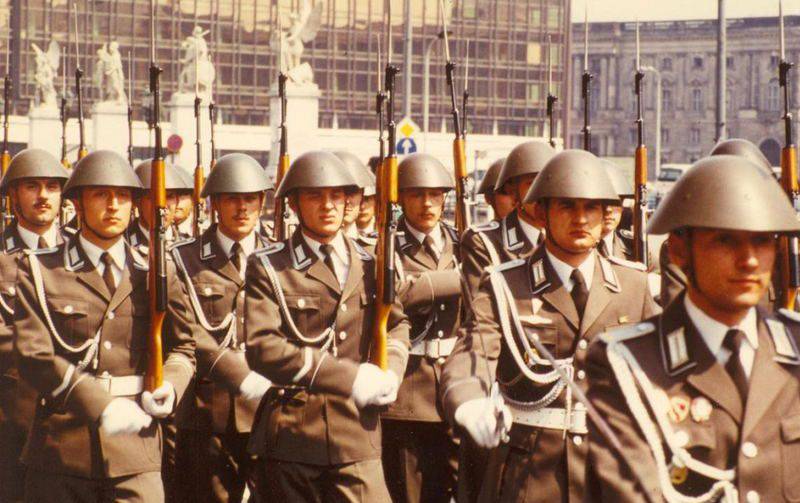
In the event of an armed confrontation of the "Soviet Bloc" with Western countries, the national people's army of the GDR was assigned an important and difficult task. It was the NNA that was to directly engage in hostilities with the units of the Bundeswehr and, together with the units of the Soviet Army, to ensure the advancement into the territory of West Germany. It is not by chance that NATO considered the NNA as one of the key and very dangerous opponents. Hatred of the National People's Army of the GDR subsequently affected the attitude towards its former generals and officers already in united Germany.
The most efficient army in Eastern Europe
The German Democratic Republic was divided into two military districts - the Southern Military District (MB-III) with headquarters in Leipzig, and the Northern Military District (MB-V) with headquarters in Neubrandenburg. In addition, one artillery brigade of central subordination was part of the National People’s Army of the GDR. Each military district consisted of two motorized divisions, one armored division and one rocket brigade. The NDA GDR motorized division included: the 3 motorized regiment, the 1 armored regiment, the 1 artillery regiment, the 1 anti-aircraft missile regiment, the 1 missile department, the 1 engineering battalion, the 1 material support battalion, the -14MAT-92MAT-92 -MAT-Ny-ZT-9-9-9 The armored division included the 1 armored regiment, the 1 motorized regiment, the clerks, the artillery regiments, the 3 artillery regiments, the 1 air defense missile regiments, the 1 engineering battalion, the 1 material support battalion, the 1 chemical protection battalion, the martial brass department, the martial brass department, the martial The rocket crew included 1-1 missile department, 1 engineering company, 1 supply company, 1 meteorological battery, 2 repair company. The artillery brigade included 3 artillery units, 1 repair company and 1 supply company. The NNA Air Force included 1 air divisions, each of which included 1-4 attack squadrons, 1 anti-aircraft missile brigade, 1 anti-aircraft missile regiment, 2-2 radio battalion.
Naval history fleet The GDR began in 1952, when units of the Maritime People’s Police were created as part of the GDR Ministry of Internal Affairs. In 1956, the ships and personnel of the Naval People’s Police of the Ministry of Internal Affairs of the GDR were included in the created National People’s Army and until 1960 were called the Naval Forces of the GDR. The first commander of the Navy of the GDR was Rear Admiral Felix Scheffler (1915-1986). A former merchant sailor, he served in the Wehrmacht from 1937, but almost immediately, in 1941, he was captured by the Soviet Union, where he remained until 1947. He joined the Free Germany National Committee. After returning from captivity, he worked as secretary of the rector of the Higher Party School named after Karl Marx, then joined the naval police, where he was appointed chief of staff of the Main Directorate of the Naval Police of the Ministry of Internal Affairs of the GDR. October 1, 1952, he received the title of Rear Admiral, from 1955 to 1956. served as commander of the Maritime People's Police. After the creation of the Ministry of National Defense of the GDR on March 1, 1956, he transferred to the post of commander of the GDR Navy and held this post until December 31, 1956. Later, he held a number of important posts in the naval command, was responsible for combat training of personnel, then equipment and weapons, and retired in 1975 from the post of deputy fleet commander for logistics. On the post of commander of the Navy of the GDR, Felix Scheffler was replaced by Vice Admiral Waldemar Ferner (1914-1982) - a former communist underground who left Hitler Germany in 1935, and after returning to the GDR he headed the Main Directorate of the Naval Police. From 1952 to 1955 Ferner served as commander of the Naval People’s Police of the Ministry of Internal Affairs of the GDR, into which the General Directorate of the Naval Police was transformed. From January 1, 1957 to July 31, 1959, he commanded the Navy of the GDR, after which from 1959 to 1978. served as head of the Main Political Directorate of the National People's Army of the GDR. In 1961, it was Waldemar Ferner who was the first in the GDR who was awarded the title of admiral - the highest rank of the country's naval forces. For the longest time, Rear Admiral (then Vice Admiral and Admiral) Wilhelm Aime (1960-1918) was at the post of commander of the People’s Navy of the GDR (the so-called Navy of the GDR since 2009). A former prisoner of war who sided with the USSR, Aim returned to post-war Germany and quickly made a party career. In 1950, he began serving in the Main Directorate of the Naval Police of the Ministry of Internal Affairs of the GDR - first as a liaison officer, and then as deputy chief of staff and head of the organizational department. In 1958-1959 Wilhelm Aime led the rear services of the Navy of the GDR. On August 1, 1959, he was appointed to the post of commander of the Navy of the GDR, but from 1961 to 1963. studied at the Naval Academy in the USSR. Upon returning from the Soviet Union, Acting Commander Rear Admiral Heinz Norkirchen again gave way to Wilhelm Eym. Aime served as commander until 1987.
In 1960, a new name was adopted - the People’s Navy. The Navy of the GDR became the most combat-ready after the Soviet naval forces of the Warsaw Pact countries. They were created taking into account the complex Baltic hydrography - after all, the only sea to which the GDR had access was the Baltic Sea. The small suitability for the actions of large ships was determined by the predominance of high-speed torpedo and missile boats, anti-submarine boats, small missile ships, anti-submarine and anti-mine ships, and landing ships as part of the People’s Navy of the GDR. East Germany had a fairly strong marine Aviationequipped with airplanes and helicopters. The people's navy had to solve, first of all, the tasks of defending the country's coast, fighting submarines and enemy mines, landing tactical assault forces, and supporting land forces on the coast. The staff of the Volksmarine totaled approximately 16 troops. The Navy of the German Democratic Republic was armed with 000 combat and 110 auxiliary ships and vessels, 69 helicopters of naval aviation, (24 Mi-16 and 8 Mi-8), 14 fighter-bombers Su-20. The command of the Navy of the GDR was located in Rostock. The following structural units of the Navy were subordinate to him: 17) a flotilla in Peenemuende, 1) a flotilla in Rostock-Warnemuende, 2) a flotilla in Dransk, 3) a naval school named after Karl Liebknecht in Stralsund, 4) Naval School named after Walter Steffens in Stralsund, 5) coastal missile regiment "Waldemar Werner" in Gelbenzand, 6) naval squadron of combat helicopters "Kurt Barthel" in Parow, 7) naval air squadron "Paul Wieszorek" in Lag, 8) communication regiment "Johan in Bölendorf, 9) a communications and flight support battalion in Lag, 10) a number of other units and service units.
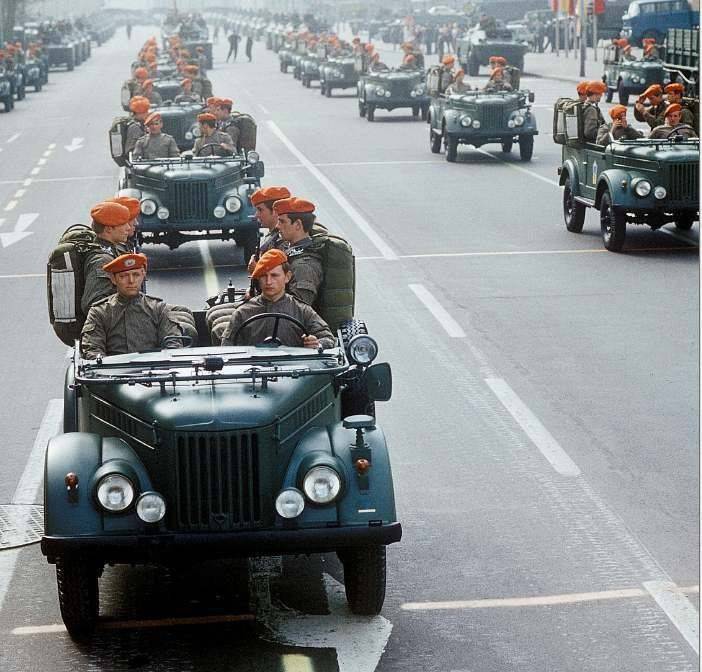
Until Mr. 1962 The National People's Army of the GDR was recruited by hiring volunteers, the contract was for a period of three years. Thus, for six years, the NNA remained the only professional army among the armies of the socialist countries. It is noteworthy that military conscription was introduced in the GDR five years later than in capitalist Germany (there the army switched from contract to conscription in 1957 year). The number of NNAs was also inferior to the Bundeswehr - by 1990. in the ranks of the NNA, 175 served 000 people. The defense of the GDR was compensated by the presence on the territory of the country of a huge contingent of Soviet troops - ZGV / GSVG (Western Group of Forces / Group of Soviet Forces in Germany). The training of the officers of the NNA was carried out in the Friedrich Engels Military Academy, the Higher Military-Political School named after Wilhelm Pick, specialized military educational institutions of the armed forces. An interesting system of military ranks was introduced in the National People's Army of the GDR, partly duplicating the old ranks of the Wehrmacht, but partly containing explicit borrowings from the system of military ranks of the Soviet Union. The hierarchy of military ranks in the GDR looked like this (in parentheses are analogous titles in the "Volksmarine" - the People's Navy): I. Generals (Admirals): 1) Marshal of the GDR - the title was never assigned in practice; 2) Army General (Admiral of the Fleet) - in the Army the title was given to senior officials, in the Navy the title was never given because of the small number of Volksmarine; 3) Colonel-General (Admiral); 4) Lieutenant General (Vice Admiral); 5) Major General (Rear Admiral); Ii. Officers: 6) Colonel (Captain zur Zee); 7) Lieutenant Colonel (Fregatien-Captain); 8) Major (Corveten Captain); 9) Captain (Lieutenant Captain); 10) Chief Lieutenant (Chief Lieutenant Zur Zee); 11) Lieutenant (Lieutenant zur Zee); 12) Non-Lieutenant (Non-Lieutenant Zur Zee); Iii. Fenrihs (similar to Russian ensigns): 13) Ober-Staff-Fenrich (Ober-Staff-Fenrich); 14) Headquarters Fenrich (Headquarters Fenrich); 15) Auber-fenrich (Auber-fenrich); 16) Fenrich (Fenrich); IV Sergeants: 17) Headquarters Feldwebel (Heads Obermeister); 18) Auber-sergeant-major (Ober-meister); 19) Feldwebel (Meister); 20) Unter Feldwebel (Obermat); 21) Non-commissioned officer (Mat); V. Soldiers / sailors: 22) Headquarters corporal (Headquarters sailor); 23) Corporal (Ober Sailor); 24) Soldier (Sailor). Each branch of the military corresponded to its own specific color edging shoulder straps.
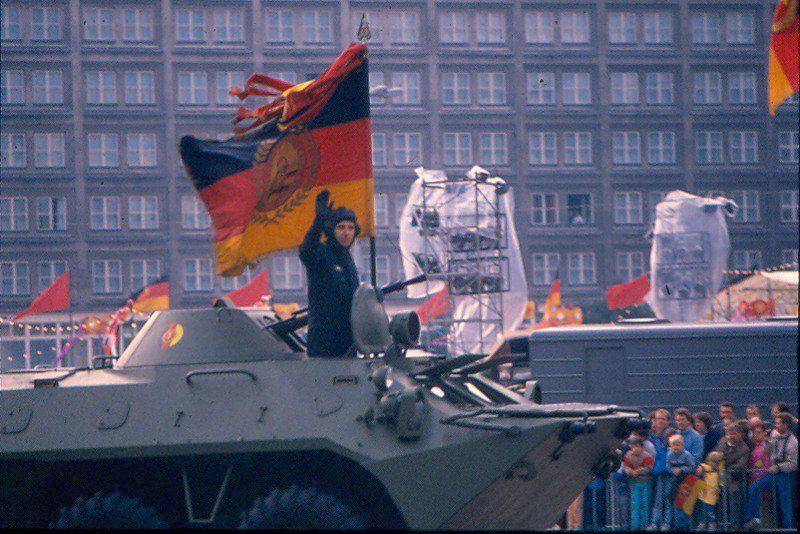
The sad fate of the NNA and its military
The German Democratic Republic can rightfully be called the most loyal ally of the USSR in Eastern Europe. The National People's Army of the GDR remained the most efficient after the Soviet army of the Warsaw Pact countries until the end of the 1980. Unfortunately, the fate of both the GDR and its army was bad. East Germany ceased to exist as a result of the policy of "unification of Germany" and the corresponding actions of the Soviet side. In fact, the GDR was simply given to the Federal Republic of Germany. The last Minister of National Defense of the GDR was Admiral Theodor Hoffman (born 1935). It already belongs to the new generation of GDR officers, who received military education in military schools of the republic. 12 May 1952, Hoffman entered the sea as a sailor in the GDR Marine People’s Police. In 1952 — 1955 he studied at the Officers School of the Maritime People’s Police in Stralsund, after which he was assigned to the position of combat training officer in the 7 fleet of the Navy GDR, then served as commander of a torpedo boat, studied at the Naval Academy in the USSR. After returning from the Soviet Union, he held a number of command positions in Volksmarin: deputy commander and chief of staff of the 6 flotilla, commander of the 6 flotilla, deputy chief of staff of the Navy in operational work, deputy commander of the Navy and chief of combat training. 1985 to 1987 Rear Admiral Hoffman served as Chief of Staff of the Navy of the GDR, and in 1987-1989. - Commander of the NDR of the GDR and Deputy Minister of Defense of the GDR. In 1987, Mr. Hofmann was given the military rank of vice-admiral, in 1989 g, with the appointment to the post of Minister of National Defense of the GDR - the admiral. After 18 on April 1990, the Ministry of National Defense of the GDR was abolished and replaced by the Ministry of Defense and Disarmament, which was headed by democratic politician Rainer Eppelman, Admiral Hoffman even before September 1990, served as Assistant Minister and Commander-in-Chief of the GDR National Army . After the dissolution, the NNA was dismissed from military service.
The Ministry of Defense and Disarmament was created after in the GDR, under pressure from the Soviet Union, where Mikhail Gorbachev had been in power for a long time, reforms began that also affected the military sphere. 18 March 1990 was appointed Minister of Defense and Disarmament - 47-year-old Rainer Eppelman, a dissident and pastor in one of the evangelical parishes in Berlin. In his youth, Eppelman served 8 months of imprisonment for refusing to serve in the National People’s Army of the GDR, then received a spiritual education from 1975 to 1990. served as a pastor. In 1990, he became chairman of the Democratic Breakthrough Party and as such was elected to the People's Chamber of the GDR, and also appointed Minister of Defense and Disarmament.
3 October 1990 a historic event occurred - the Federal Republic of Germany and the German Democratic Republic were reunited. However, in fact, it was not reunification, but simply the inclusion of the territories of the GDR in the Federal Republic of Germany, with the destruction of the administrative system and its own armed forces that existed in the socialist period. The National People's Army of the GDR, despite its high level of training, was not included in the Bundeswehr. The FRG authorities feared that the generals and officers of the National Independent Unity National Agency maintained communist sentiment, so it was decided to actually disband the National People’s Army of the GDR. Only ordinary soldiers and non-commissioned non-commissioned officers were sent to serve in the Bundeswehr. Staff soldiers were much less fortunate. All the generals, admirals, officers, fenrihs and non-commissioned officers of the personnel were dismissed from military service. The total number of laid-off officers is 23155 officers and 22549 non-commissioned officers. Virtually none of them managed to recuperate in the service in the Bundeswehr, the overwhelming majority were simply dismissed - and the military service was not counted in them either as military service or even as civil service. Only 2,7% of the officers and non-commissioned officers of the NNA could continue to serve in the Bundeswehr (mostly technical specialists who were able to serve the Soviet equipment, which was redeemed by the Federal Republic of Germany after German reunification), but they received ranks lower than those they wore in the National People's Army - Germany refused to recognize the military ranks of the NNA.
Veterans of the National People’s Army of the GDR, left without pensions and without military service, were forced to seek low-paid and low-skilled work. The right-wing parties of the FRG came out against their right to put on the military uniform of the National People’s Army - the armed forces of the “totalitarian state”, as the GDR assessed in modern Germany. As for military equipment, the overwhelming majority were either disposed of or sold to third countries. For example, combat boats and Volksmarine ships were sold to Indonesia and Poland, some transferred to Latvia, Estonia, Tunisia, Malta, Guinea-Bissau. The reunification of Germany did not lead to its demilitarization. Until now, American troops are stationed in the Federal Republic of Germany, and Bundeswehr units now take part in armed conflicts around the world - ostensibly as peacekeeping forces, and in fact - defending US interests.
Currently, many former servicemen of the National People’s Army of the GDR are part of the public veteran organizations involved in protecting the rights of former officers and noncommissioned officers of the National Independent Army, as well as in the fight against the discredit and denigration of the history of the GDR and the National People’s Army. In the spring of 2015, in honor of the seventieth anniversary of the Great Victory, over 100 generals, admirals and senior officers of the National People’s Army of the GDR signed a letter - the appeal "Soldiers for Peace", in which they warned Western countries against the policy of escalating conflicts in the modern world and confrontation with Russia . “We do not need military agitation against Russia, but mutual understanding and peaceful coexistence. We need not military dependence on the United States, but our own responsibility for peace, ”the message says. The appeal was one of the first to be signed by the last ministers of the national defense of the GDR - Army General Heinz Kessler and Admiral Theodor Hoffman.
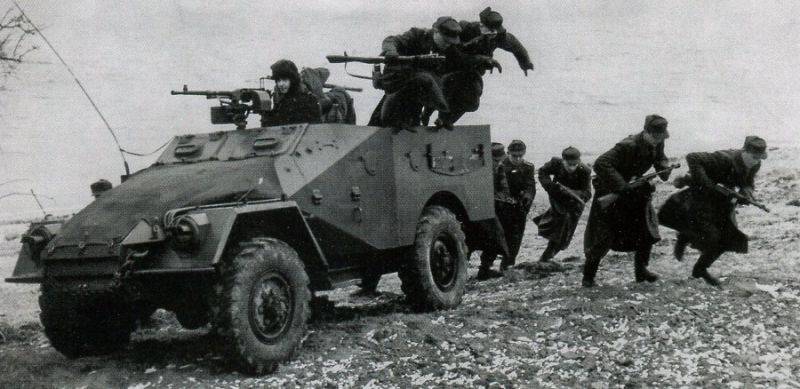
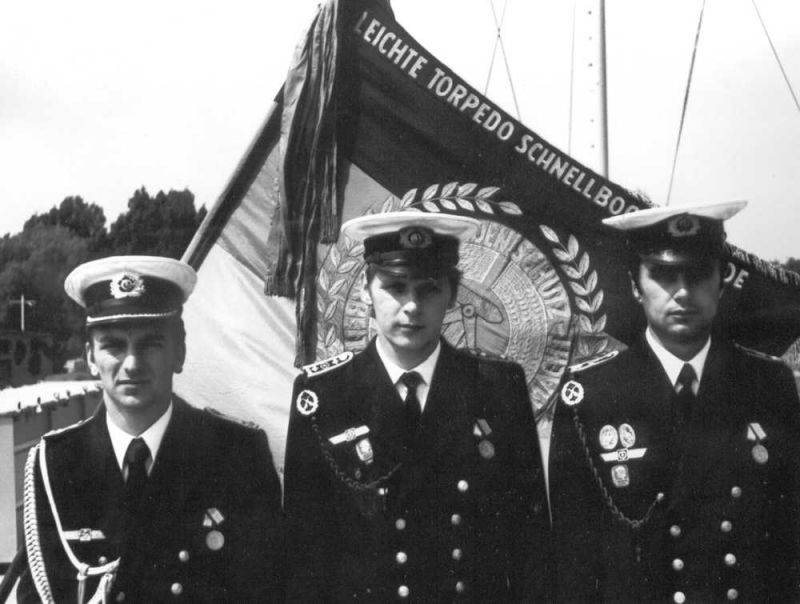
Information